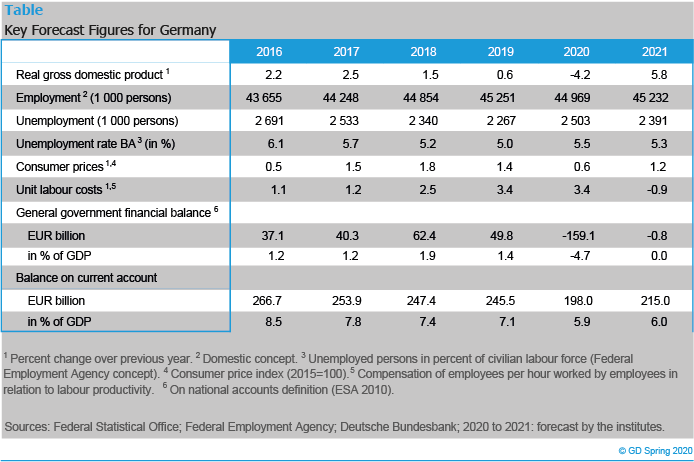News
Joint Economic Forecast 1/2020: Economy in Shock – Fiscal Policy to Counteract

Gross domestic product is likely to have shrunk by 1.9 percent in the first quarter of 2020 alone. In the second quarter, it will slump by 9.8 percent as a result of the shutdown. This is the sharpest decline ever recorded in Germany since quarterly national accounts began in 1970; it is also more than twice as steep as the decline during the global financial crisis in the first quarter of 2009.
“The recession is leaving very clear marks on the labor market and the government budget,” says Timo Wollmershäuser, Head of Forecasts at ifo. “At its peak, the unemployment rate will jump to 5.9 percent this year and the ranks of short-time workers will swell to 2.4 million.” On average, the unemployment figures will rise by almost a quarter of a million to 2.5 million year over year.
“Germany is in a good position to cope with the economic slump and to return in the medium term to the economic level that it would have reached without the crisis,” Wollmershäuser says. Given its favorable financial situation, the government can afford to enact far-reaching measures to cushion the short-term negative consequences for companies and private households. This year, these measures will lead to a record deficit for the general government (federal government, states, municipalities, social security) of EUR 159 billion. General government gross debt is expected to increase to 70 percent of nominal GDP this year.
The downside risks associated with this forecast are considerable. For instance, the pandemic could abate much more slowly than anticipated. Efforts to restart the economy might also be less than successful and could trigger a new wave of infections. What’s more, additional infection control measures could come into force, which could lead to longer or more extensive production stoppages. This would increase the likelihood of distortions in the financial system as a result of increasing corporate insolvencies that could not be prevented by state support.

The Joint Economic Forecast was prepared by the German Institute for Economic Research (DIW Berlin), the ifo Institute (Munich), the Kiel Institute (IfW Kiel), the Halle Institute for Economic Research (IWH), and RWI (Essen).
About the Joint Economic Forecast
The Joint Economic Forecast is published twice a year on behalf of the German Federal Ministry for Economic Affairs and Energy. The following institutes participated in the spring report 2020:
- German Institute for Economic Research (DIW Berlin)
- ifo Institute – Leibniz Institute for Economic Research at the University of Munich in cooperation with the KOF Swiss Economic Institute at ETH Zurich
- Kiel Institute for the World Economy (IfW Kiel)
- Halle Institute for Economic Research (IWH) – Member of the Leibniz Association
- RWI – Leibniz Institute for Economic Research in cooperation with the Institute for Advanced Studies Vienna
Scientific contacts
Dr. Claus Michelsen
German Institute for Economic Research (DIW Berlin)
Phone +49 30 89789 458
CMichelsen@diw.de
Professor Dr. Timo Wollmershäuser
ifo Institute – Leibniz Institute for Economic Research at the University of Munich
Phone +49 89 9224 1406
Wollmershaeuser@ifo.de
Professor Dr. Stefan Kooths
Kiel Institute for the World Economy (IfW Kiel)
Phone +49 341 8814 579 oder +49 30 2067 9664
Stefan.Kooths@ifw-kiel.de
Professor Dr. Oliver Holtemöller
Halle Institute for Economic Research (IWH) – Member of the Leibniz Association
Phone +49 345 7753 800
Oliver.Holtemoeller@iwh-halle.de
Professor Dr. Torsten Schmidt
RWI – Leibniz Institute for Economic Research
Phone +49 201 8149 287
Torsten.Schmidt@rwi-essen.de

